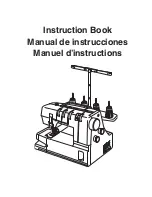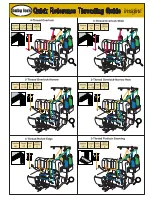
BEFORE
YOU
BEGIN
22
INTRODUCTION
IMPORT
ANT
PRECAUTIONS
ASSEMBL
Y
BEFORE
YOU
BEGIN
STEPPER
OPERA
TION
LIMITED
W
ARRANTY
TROUBLESHOOTING
&
MAINTENANCE
CONDITIONING
GUIDELINES
ASSEMBL
Y
CONDITIONING
GUIDELINES
BEFORE YOU
BEGIN
ASSEMBL
Y
2
INTRODUCTION
IMPORT
ANT
PRECAUTIONS
STEPPER OPERA
TION
CONDITIONING GUIDELINES
TROUBLESHOOTING &
MAINTENANCE
LIMITED WARRANTY
CONDITIONING GUIDELINES
ASSEMBL
Y
100%
75%
60%
BE
AT
S
PE
R
M
IN
UT
E
20 25 30 35 40 45 50 55 60 65
AGE
T A
R G
E T
Z O
N E
120
117
114
111
108
105
102
99
97
93
150
146
143
139
135
131
128
124
120
116
What is Target Heart Rate Zone?
Target Heart Rate Zone tells you the number
of times per minute your heart needs to
beat to achieve a desired workout effect.
It is represented as a percentage of the
maximum number of times your heart can
beat per minute. Target Zone will vary for
each individual, depending on age, current
level of conditioning, and personal fitness
goals. The American Heart Association
recommends working-out at a Target Heart
Rate Zone of between 60% and 75% of
your maximum heart rate. A beginner will
want to workout in the 60% range while
a more experienced exerciser will want to
workout in the 70-75% range. See chart
for reference.
EXAMPLE:
For a 42-year-old user: Find age along the
bottom of the chart (round to 40), follow
age column up to the target zone bar.
Results: 60% of maximum Hear Rate =
108 Beats Per Minute, 75% of maximum
Heart Rate = 135 Beat Per Minute.
ALWAYS CONSULT YOUR PHYSICIAN BEFORE BEGINNING AN EXERCISE PROGRAM.
TARGET HEART RATE ZONE CHART
. SITTING HAMSTRING & LOWER BACK MUSCLE STRETCH
Sit on the floor with your legs together and straight out in front of you. Do not lock your knees.
Extend your fingers towards your toes and hold for a count of 15 seconds. Make sure that you
do not bounce while stretching. Sit upright again. Repeat one time.
STRETCHING
TIPS
STRETCH FIRST
Before using your product, it is best to take a few minutes to do a few gentle stretching exercises. Stretching
prior to exercise will improve flexibility and reduce chances of exercise related injury. Ease into each of these
stretches with a slow gentle motion. Do not stretch to the point of pain. Make sure not to bounce while doing
these stretches.
1. STANDING CALF MUSCLE STRETCH
Stand near a wall with the toes of your left foot about 18"
from the wall, and the right foot about 12" behind the other
foot. Lean forward, pushing against the wall with your palms.
Keep your heels flat and hold this position for a count of 15
seconds. Make sure that you do not bounce while stretching.
Repeat on the other
2. STANDING QUADRICEP STRETCH
Using a wall to provide balance, grasp your right ankle
with your right hand and hold your foot against the back of
your thigh for 15 seconds. Repeat with your left ankle and
hand.
625S_Eng_Rev.2.0.indd 22-23
9/29/08 2:58:20 PM



































